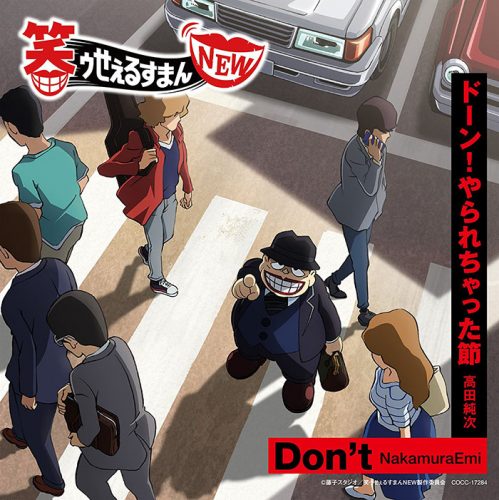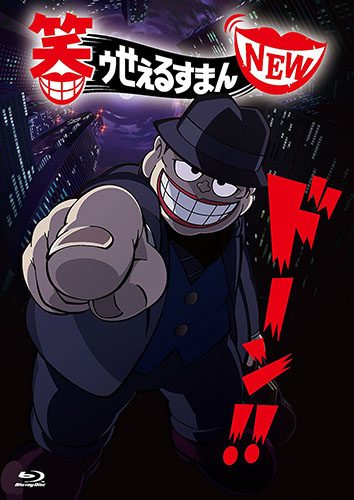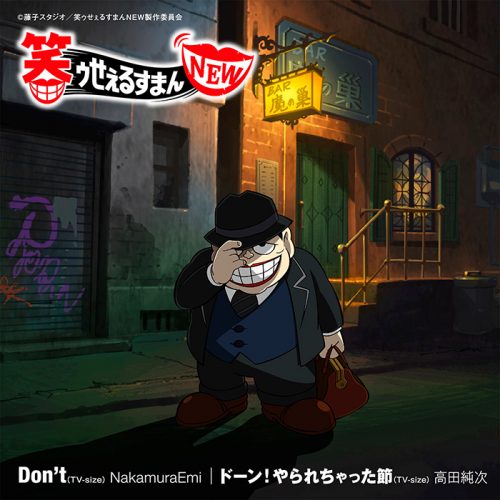
To Fill the Holes in My Clients’ Hearts
- Episodes : 12
- Genre : Comedy, Horror, Seinen
- Airing Date : April 3, 2017 – June 19 2017
- Studios : Shin-Ei Animation
Contains Spoilers
Warau Salesman NEW Introduction and Story
Moguro is a wandering salesman with one goal in mind: bringing his clients happiness! He doesn’t even ask to be paid! All he wants to do is to help those who feel empty inside and treat them to the desires that they’re suppressing. They only need to follow Moguro’s instructions to a T, or else he can’t guarantee what may happen to them…
The above just about sums up the entirety of Warau Salesman NEW. Each episode consists of two short stories that all follow the exact same pattern. There is someone who is living a perfectly normal, carefree life, but Moguro can sense that they want something a little more; whether it’s to get out of the office for once and have some fun, they have a crush on someone but can’t work up the courage to talk to them, or even something as silly as winning an argument in a chat room. Moguro will either give them a magical item that can solve all their problems but has incredibly specific instructions that they have to follow in order for it to work, or Moguro will take them to a special area that they are only allowed to visit once. Every story ends with the client ignoring Moguro’s warning, and will result in Moguro showing up and doling out an ironic punishment for their blatant hedonism.
More broadly, however, Warau Salesman NEW is meant to be a modern revival of the Warau Salesman franchise, similar to how Studio Pierrot managed to successfully reboot Osomatsu-san in 2015. Much like Osomatsu-san, it was a popular manga that began in the 1960s and ran into the 70s. However, the height of its popularity was actually in the 80s when it got a major TV anime. Warau Salesman is pretty much exactly what the original manga and the 80s anime were, except with stories that deal with more contemporary issues. We have Moguro signing up clients for special texting services through their phones, stories about pop idols, and stories about people who are actually nostalgic for the 60s.
What We Liked About Warau Salesman NEW (The Laughing Salesman NEW)
For a series so old, you’d be surprised by how well the concept of the series holds up. There’s nothing out there now that really feels quite like it. So many anime out there now are so focused on telling a long running narrative about high schoolers saving the country or making their mark on the world, that it’s refreshing to have a show more focused on atmosphere and message. It’s closer to a modern day Grimm fairy tale, with each story being centered on educating the viewer on a moral or message to follow in their everyday life.
Perhaps one of the best examples of this comes from an early series story of a man who’s sick of getting harangued by his boss and just wants a peaceful job without competition. Moguro tracks him down and gets him a job at a warehouse where everyone takes their turn being the boss. The man gets his taste of being the boss and gets frustrated when he feels that everyone else isn’t as good as management as he is. He starts getting pushy and intrusive with his co-workers, forcing his ideas down their throat. Moguro stops him before he completely destroys the work culture and casts a spell to turn him into an exhibit at the warehouse as a reminder of what working a normal job is like. It’s a simple, but effective message that the series conveys pretty succinctly: don’t let the toxic nature of your past work life infect your new one.
Discussion Time
Warau Salesman NEW is best viewed understanding one very simple rule: the format never changes. There are no exceptions to the formula. Every episode is going to play out the same way every single time. You’re never going to get any hints at an underlying plot thread about underlying reasons as to why Moguro is doing this, a connecting plot thread to tie together any of the client stories, or a deeper lore to the world-building. It is a 60s manga that has been transported five decades into the future, written with the exact same sensibilities that a work from its era might have.
Because of this, Warau Salesman NEW isn’t going to be for everyone. There are exactly two motivations to watch one of the two vignettes an episode provides. First, it’s the animation style itself. Once again, because the art is ripped straight out of the 60s, there’s nothing out there quite like it, which gives the show a distinct flavor. The show plays with its imagery in fun ways, such as Moguro’s permanent toothy grin. Sometimes it’s played up for a gag, such as when a character grabs Moguro and he stands there, almost blissfully unaware that he’s on the receiving end of some intense rage. Other times, though, it’s much more sinister, mostly when Moguro shows up to sentence his victim. It’s this blank expression that allows the series to adapt our reaction to it based on the context rather than forcing a meaning onto it. It’s a reminder of how the mascot-style design that was popular in the 60s with the rise of characters of Doremon and Sazae-san isn’t necessarily outdated; just that we need to learn how to adapt it to more modern sensibilities.
The other drive to watch the show comes from watching the creative punishments found at the end of each episode. This is perhaps where the show is at its most uneven. Some episodes, like the aforementioned story of the warehouse worker, have a fairly straightforward message. Other times, though, Warau Salesman feels almost vindictive in how it doles out its punishments. It’s hard to tell sometimes if it’s an issue of keeping in line with attitudes prevalent in the 60s or if the show is just struggling to adapt its writing to that of the original author. It leads to it feeling like sometimes you’re playing the slots when you load up an episode.

1. The Opening

This might seem like a strange selection, but trust us: the opening theme is seriously impressive. The minimalist animation conveys a depressing world where all individuality has been lost. People line up to be sent off to work, pre-packaged and delivered by trains as just another cog in the machine, and the only way people can feel alive is through booze and sex. Meanwhile, the background music is laced with a funky bassline and Nakamura Emi singing about how it’s okay to give into temptation sometimes. It’s a seriously great opening and sets the tone for the series better than any description probably could.
2. Unique art direction
We’ve detailed a little bit why the art direction works already, but it bears repeating. People’s instincts towards humor and horror derive from the unknown, and Warau Salesman understands this through Moguro’s design. It’s just goofy enough that it can be played up for gags, but even then, there’s this sense of unease to him, like you’re never really sure what he’s hiding behind that smile. This plays very well into the show’s atmosphere, and pretty much sells the entire premise of the anime.
However, we’d be remiss if we didn’t mention the various different stars of each episode. If you want pretty heroes, this isn’t the series for you. So much anime is about the idealism of youth, but Warau Salesman’s characters are pretty distinctly unattractive. In fact, their designs stand out against the often much prettier side-characters in each story. It’s a story about common people and their problems, and the art reflects that.
3. Distinctive Story Set-Up
In an industry where big fantasy stories or aimless slice-of-life comedies are the name of the game, it’s certainly nice to have a series that’s so defiantly different. We really don’t see this type of morality story in anime anymore, or at least not ones that we get in the West. Anyone who’s looking for something totally new will probably be interested in checking out a few of Warau Salesman NEW’s stories.
1. Unfocused plots for several of the stories
Unfortunately, not all the stories are winners. Much of the satisfaction of an episode is going to come down to its resolution, since the story up until that point is fairly predictable due to its insistence on adhering to formula. An entire episode of Warau Salesman NEW hinges on the ending having a satisfyingly ironic fate. A failure to match the punishment to the crime can then lead to it feeling like wasted time more than anything.
There’s an episode about a man who travels to different bathhouses looking for his perfect bathhouse painting. He meets up with Moguro, who manages to locate a bathhouse that holds a painting that meets all the man’s requirements for perfection. There’s a silver-haired beauty who works there as an attendant, and the man is lucky enough to get a backwashing from her while he stares longingly at the painting. Moguro tells him, though, that he can only visit this bathhouse once and that the guy should let it go. However, he soon tracks down Moguro and begs him to take him back. Moguro relinquishes, and takes him back. He’s horrified to discover that the bathhouse is now a dump and the once-gorgeous attendant is actually a terrifying poltergeist. It’s difficult to get a sense of what the man did wrong outside of just not listening to Moguro. What’s the connection with wanting to go back to see a painting? Was it because his intentions weren’t pure? Should he be punished so harshly just because he wasn’t honest about his motivation to get to know a beautiful woman more? It leaves you with more questions than answers, which goes against the relatively simple nature of the show.
2. Doesn’t go far enough
Episode 11 has a story about a mother who’s trying to live out her fantasies of becoming an idol through her daughter, who just wants to live her own life. The mother gains the ability (through Moguro, naturally) to control her daughter’s actions for a limited time. When time runs out, and the mother fails to relinquish back control, and her daughter continues to dance outside of her own control. The daughter is now conscious of her surroundings and cries out desperately for help as she’s forced to keep dancing. Eventually her dancing takes her out into the middle of a busy street. The mother sobs uncontrollably and in one final, noble act jumps out to save her daughter being hit by a car. In perhaps his only act of true mercy in the show, Moguro casts a spell to change the timeline so that the mother, still 37 years old, must work as an idol in place of her daughter, embarrassing herself to the public in the same way she was forcing her daughter to, while sparing the daughter’s life.
The above scene is perhaps one of the best sequences in the whole series, but we list it here because it highlights a lot of the wasted potential found in Warau Salesman NEW’s comedy/horror blend. Despite the rather menacing build-up to each finale, the end results are really treated more like punchlines than poignant moments. Far too often, the series has a tendency to end with a “the girl was UGLY all along” twist, which gets stale and repetitive far too often. Episode 11’s mother idol story is the only time where it feels like the horror bend to the series has any sort of meaningful impact on the story, and it’s a shame, because it gives us a glimpse of what the series could have been had the writers experimented more with horror.
Final Thoughts
While Warau Salesman is not everything it could have been, it at least stands out amongst its peers. If you’re tired of current anime trends, Warau Salesman NEW provides a change of pace. It’s just a shame that it doesn’t quite live up to its potential in spite of its flashes of brilliance. Still, for those flashes alone, it might be worth a look.
Disagree? Any episodes we missed that you loved? Please, share your thoughts in the comments below! We’d love to hear from you!
Recommended Post

